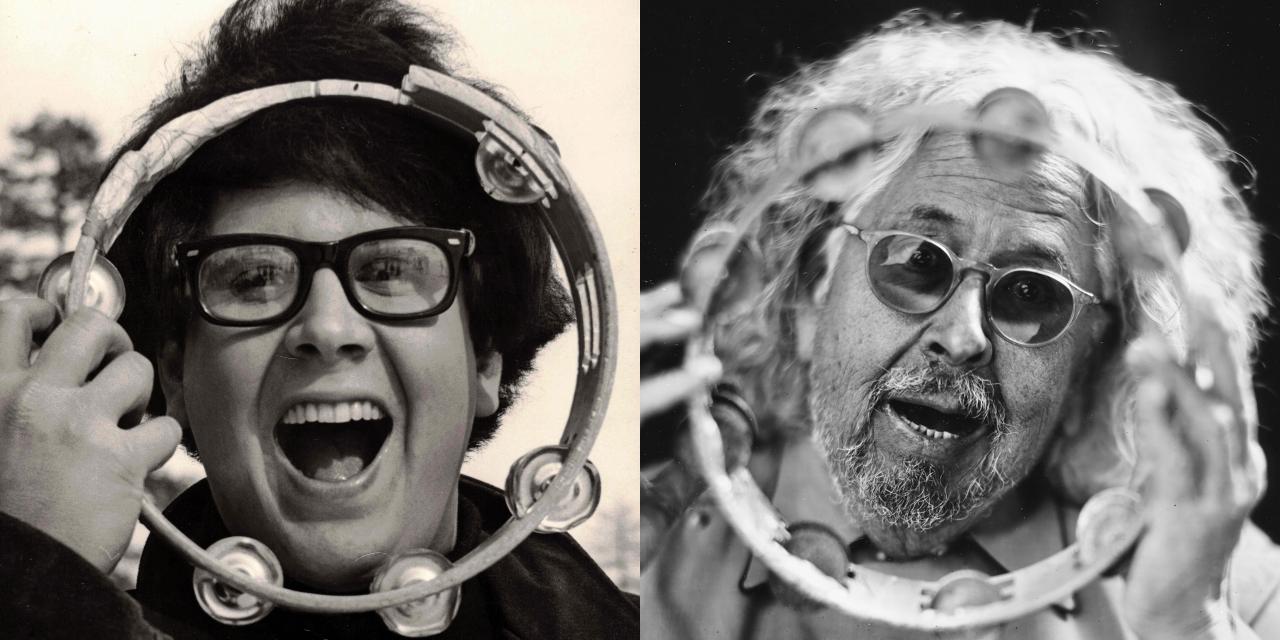Living Legends is a series that spotlights icons in music still going strong today. This week, GRAMMY.com spoke with Mark Volman, an original member of the Turtles and one half of Flo & Eddie, who had a memorable stint with Frank Zappa and the Mothers of Invention.
Volman’s reconstituted version of the Turtles is currently on the "Happy Together" tour with other 1960s acts; his new memoir, Happy Forever, is available now.
Most remember the Turtles as straight-laced hitmakers of the mid-'60s, full stop. But breeze through YouTube, and it's abundantly clear: there was manic energy under the hood ready to blow.
Take their TV performance of their signature song "Happy Together" — the one viewed 26 million times. While the band mimes along without incident, Mark Volman prances around, wildly swinging a French horn; it's as if he'd raided the instrument closet, wandered onstage and nobody asked him to leave.
When he locks eyes with lead singer Howard Kaylan — and puts the bell of the horn on Kaylan's head — there seems to be a flash of twisted, kindred recognition between the two men. In another TV performance, Kaylan's dressed like an austere 19th century banker while Volman wears a comically large, polka-dotted bowtie with matching hat.
When surveying the sea of bowl-cutted guitar combos, Frank Zappa — the patron saint of mischief — clearly sensed these guys had a screw loose. Hence, when the Turtles flamed out, Volman and Kaylan's stories were just getting going.
"I think our sense of humor was let loose when we joined Frank's group," Volman tells GRAMMY.com. "The mischief that we caused was terribly exciting."
Volman's out with a new memoir, Happy Forever, where he takes inventory of his deliciously oddball career — first with those high schoolers-turned-hitmakers, then with Kaylan in Zappa's Mothers of Invention, then striking out as the zonked duo Flo and Eddie.
But it's been far from an easy ride. From the 1980s to the 2010s, the Turtles' business and legal drama was a continuous disaster. After a Turtles-backed copyright suit in 2016 netted $99 million from SiriusXM, Volman was diagnosed with Lewy body dementia, which progressively — and negatively — impacts mood, reasoning, memory, and more.
But speaking with GRAMMY.com, Volman had a great mental day, and spoke lucidly and candidly about his unpredictable ride through the music industry.
As the "Happy Together" tour with the Cowsills, Gary Puckett, the Classics IV, and other '60s survivors rolls on through North America, read on for the full interview with Volman.
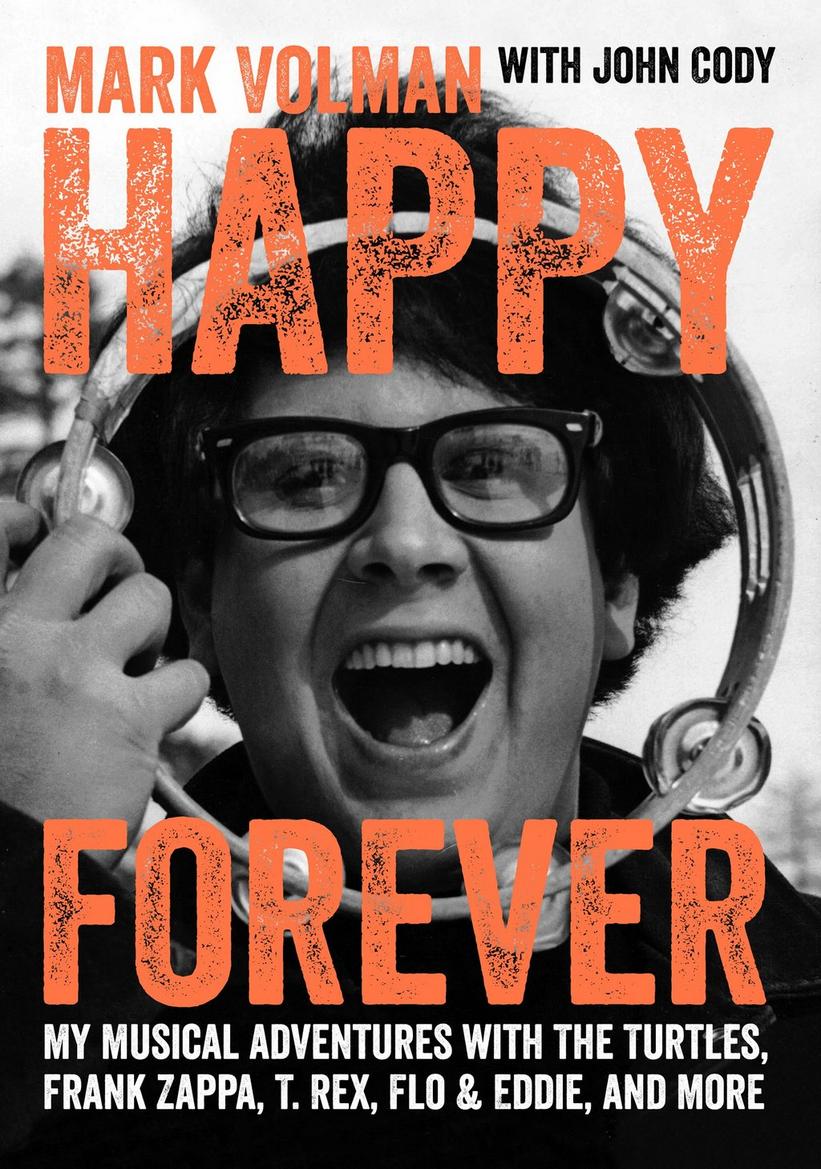
This interview has been edited for clarity.
Tell me how you realized, Wow, I've lived one hell of a life. This would make a ripping yarn.
Well, quite honestly, I started working on this book 12 years ago, and it feels like it took that long to get it done.
I don't have the kind of discipline to sit and write like that. When I felt like writing, I wrote, and when I didn't, I didn't bother. So, it took a long time to get from one point to another.
But that was what the book was kind of about, getting from one point to another. Having everybody remark about me was maybe a bit arrogant, but I thought you'd get the best look at what I've done by all the people kind of reminiscing about times that we spent.
The facts are out there; you've carved the stories in stone. But what was it emotionally like for you in the mid-1960s, when the Turtles were getting going? Was it a competitive feeling? Was there promise in the air? It just seems like a charged time.
It was a little touch of all of them. There was a feeling of ambiguity, if you kind of look at it.
We didn't really consider chasing the dream of being stars, because we had come out of high school [having] done a couple of records before we did "It Ain't Me Babe." We had already built a fan base out of our high school in Westchester, Los Angeles, California.
We just were really content to have the time that we did have, because things were changing so quickly in terms of leaving folk/rock behind, and shifting gears to how successful pop music was going to be. You really just kind of worried about yourself.
I know we hardly had the time to compete with the groups of that time, because there was a lot of content that needed to be created for radio, for television, and all of the other dimensions that it was taking.
Where do you feel the Turtles fit into the L.A. milieu of the time? You and the Byrds had your breakthrough Dylan covers the same year; you guys even spelled your name with a y.
We were on a small label, so we really didn't have firepower of groups like the Byrds who were with Columbia, groups like the Beach Boys who were on Capitol.
We were on White Whale Records at the time of independence — it would be another couple years until the Beatles would start Apple.
But independent records were hard to figure out, because the competition really wasn't between the groups as much as it was the labels. A group who had a hit that was slow-moving probably was not going to be around competing very much, because there wasn't a lot of money being spent on promotion.
People didn't really have that stuff in their heads like we do today — branding and all the ways that people discover music. We had people who were old guys from record company jobs and they weren't moving towards publicity. They were moving towards how they could make more money.
One of the quickest ways was getting rid of the group that was causing petty problems. When we stepped up and said we wanted to produce ourselves, we wanted to write our own music, we wanted to do all of these things that we saw the Beatles do. That was just not happening on White Whale Records.
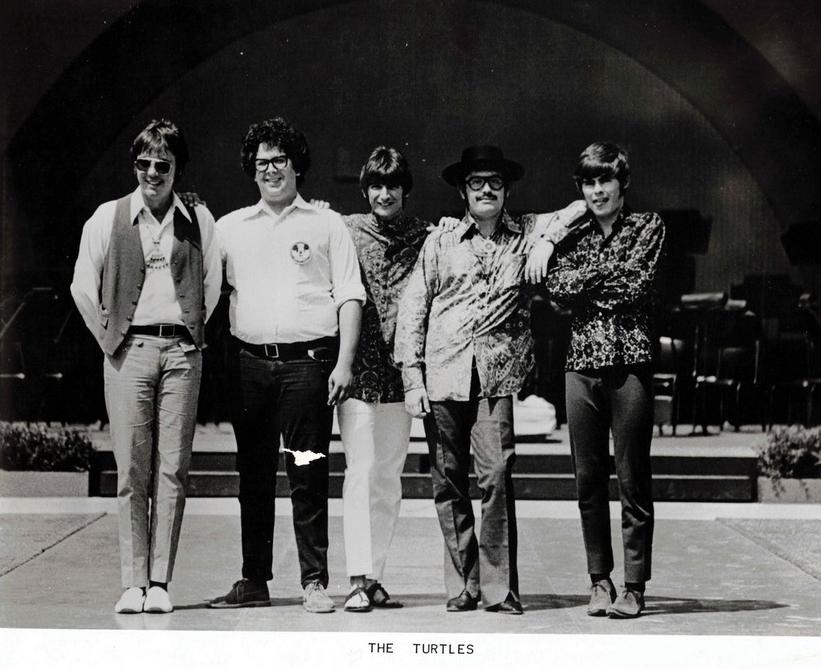
*The Turtles in 1967. Image courtesy of the artist.*
Happy Together and its title track marked an evolutionary step nonetheless.
Happy Together probably sold a lot more records than a lot of other artists, and it was on White Whale Records. I give a lot of credit to the time we spent arranging the record, the time spent putting the vocals all together, making an album that was going to have any kind of airplay.
Not just "Happy Together," but "She'd Rather Be With Me" and albums like [1968's The Turtles Present] The Battle of the Bands. We had probably a lot of things that we could have done if we'd have just maybe hung on, but I think being on the independent record [label] really hurt us.
In the long run, you could say we might have had a few more hits, but looking back now, we had a pretty significant career with "It Ain't Me Babe," "Let Me Be," "You Baby," "She's My Girl." You know what I mean? "Eleanor," "You Showed Me." We had a lot of good hits off.
That was kind of the hangover, was that White Whale. We never left that. I mean, we never could get away. So we just kind of played out our run, and then Howard and I joined Frank Zappa, and that was the start of a whole other part of our life.
I have a very strange sense of humor, so I connect with Flo & Eddie in all your wacko-ness. What was going on psychologically between you and Howard? I'm sure you both had a screw loose — a nutty energy raring to get out during the Turtles years.
That's a very apropos way to describe it. I think our sense of humor was let loose when we joined Frank's group.
I mean, we co-wrote movies with Frank like [1971's] 200 Motels, and we did Carnegie Hall with the Mothers and with Frank. Frank opened the door for us to explore and be involved with a lot of really grown up music.
I say "grown up" because it had guitar changes and singing parts that we created for Frank. We couldn't create those for any other place. You look at "Billy the Mountain" as a piece of music: Frank created some brilliant, fun stuff.
It opened the door to comedy music. Groups like Captain Beefheart grew out of that, and groups that came from Alice Cooper. Self-deprecation was very popular and people enjoyed the stuff we were doing, because it wasn't just traditional three-chord pop music. It had a sense of depravity.
There must have been a kinetic energy in the Mothers of Invention. I imagine you could cut the mischief in the air with a knife.
The mischief that we caused was terribly exciting.
I give a lot of Frank credit about me and Howard, because he really turned us loose. He turned us loose to sing what we could bring to the different songs. It's like "A Small Eternity with Yoko Ono," where Howard drops Yoko into a bag and we're singing.
The songs we were singing that night at the Fillmore [as captured on 1971s Fillmore East – June 1971], I think Frank really said it was OK. It was OK to "just do what you guys do." And that's pretty funny. He thought we were the cat's pajamas.
He was upset that the Mothers of Invention never got into the Hall of Fame. They did, but it was as Frank. Frank just felt that the band he had put together with [drummer] Aynsley Dunbar, me and Howard, [woodwindist and keyboardist] Ian Underwood, it was just a massive band.
Jean-Luc Ponty would come in and play with us. For Howard and I, it was just a remarkable opportunity to sing real music. The Turtles offered us a different type of real music, but it was fairly limited because radio was stuck with two minutes and 35 seconds. We were making [songs] that were whole sides of records with Frank.
Our credibility probably shot way up with Frank. Even today, the people I meet — just hearing you makes me laugh because you're exactly the audience that we wanted.
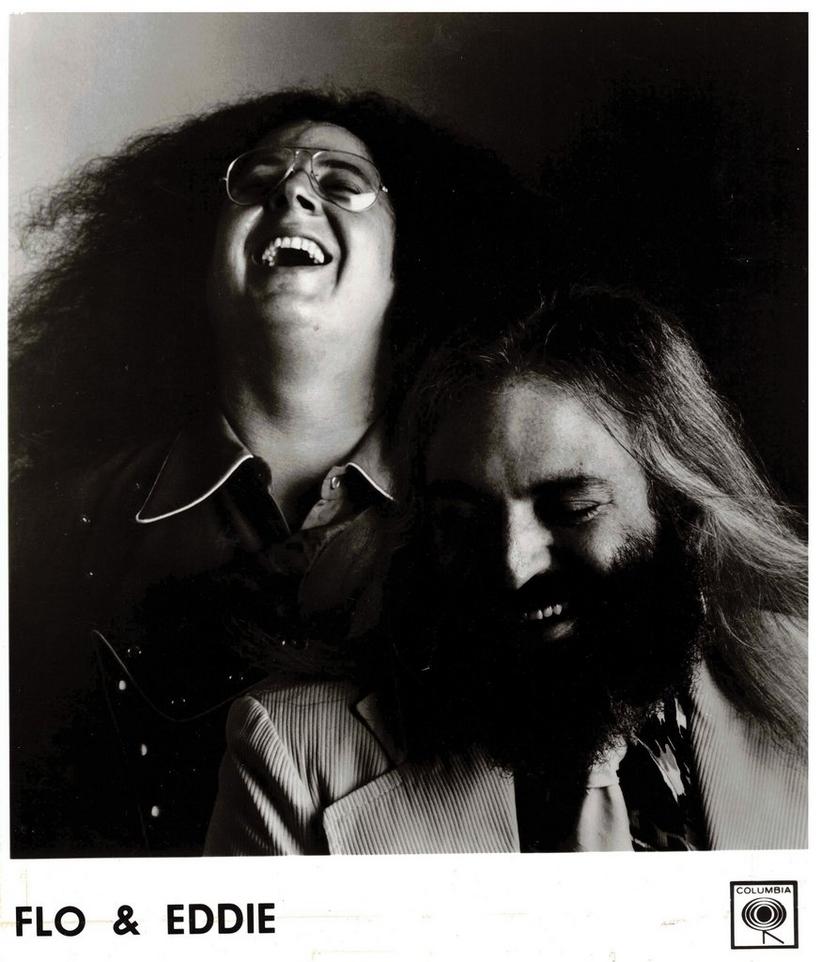
*Flo & Eddie in the 1970s. Image courtesy of the artist.*
And how did Flo & Eddie spring out of the Mothers?
Frank got pushed into an orchestra pit in London, and that was a week after the fire went off in Montreux.
There was a lot going on at that point in the music industry for Frank. Frank kind of felt very strongly that he needed to change his karma. I know that might be hard to imagine with Frank, but he actually was feeling really not well about the fire in Montreux which burned the theater completely down.
And for him being pushed into the orchestra a bit where he was unable to tour for at least a year — he had a broken back. He had a broken jaw. I mean, he was a mess.
Flo & Eddie was started because we needed to tour; we needed to make money. And there was no guarantee we were going to be back with Frank. I mean, he was out two years or something like that. So, we just treated it as Let's get to work writing, and we created [1972's] The Phlorescent Leech & Eddie.
As a duo, you and Howard had legs throughout the 1970s.
There was something going on in our heads. When you go back and listen to things like "Keep It Warm," that [was the] side of the record business that we kind of moved to, which became a little bit more challenging for the listener.
I mean, it talks about the war. Twenty years ago we were writing "Keep It Warm" and it was a very untraditional love song — a love for each other, a love for music, just all the things that were brought to that record.
[1976's Moving Targets] became a very popular record around the world. Our autobiographical kind of look at problems going on in the world. It was a challenging record for the time.
So many epochs of culture have occurred since then. What do you remember about navigating the dry spells?
Album number three was Illegal, Immoral and Fattening, and that record was different. It was kind of pointing at the music business and saying how ridiculous it kind of was.
We were singing songs about other artists. We sang a song that we wrote for Marc Bolan. It's a song about rock and roll and how there's a lot of people running around flaunting their sexuality. It was interesting because it was kind of leading us off somewhere.
And that was where we went with the autobiographical meanderings of Moving Targets. That's the album where we were transitioning to better music. It was a little bit harder with Bob Ezrin working with us who had produced Alice Cooper. So we went for a harder sell on things.
I think at that point we faced the reality that the public was just not interested, or that it just felt like our record company wasn't interested.
We had a chance to go into radio at that point in time. We signed almost a million-dollar deal for four years with radio, and all we had to do was show up and play old songs.
It wasn't as complete a finish in the heart. It felt like we were missing something that we had really wanted to do, but money always makes you aware of itself every time you get an offer.
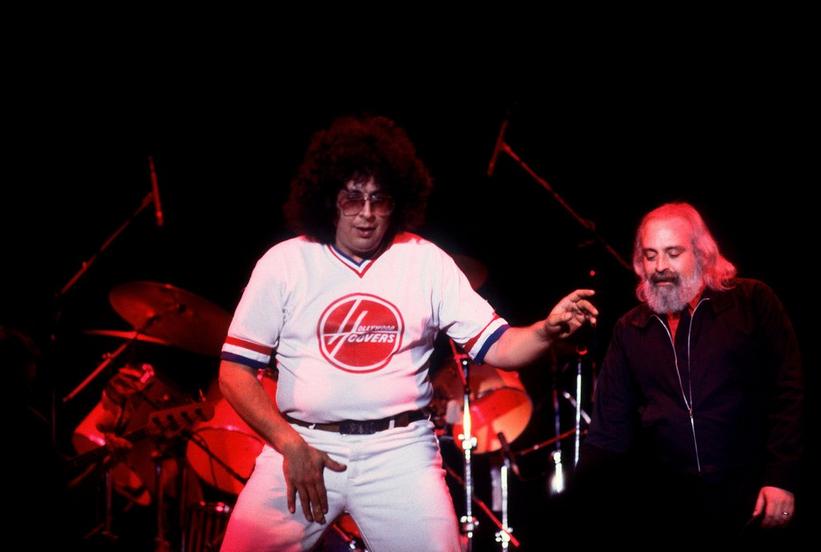
*Flo & Eddie performing in 1983. Photo: Paul Natkin/Getty Images*
In 1983, you won back the rights to the Turtles name. That must have been a point of redemption.
Yeah. Recently, [there was] that lawsuit that we were involved in with the songwriters, and the publishings, and the songs being a part of what was going on in terms of getting artists paid.
Most of the artists I grew up with didn't understand ownership of master recordings or publishing of master recordings and then performance.
That was always at the root of what we we're trying to wave our hands and say, "Hey, why don't you pay everybody? I mean, they're the ones making the records. Those artists are the people who are writing all the songs. You're already taking money from artists as publishers."
So the beginning of that whole situation that took off was in the 1970s. For our part of the bargain, we wanted to own the recordings because we found a discrepancy of about $600,000 in the White Whale auditing. And we went to an attorney and says, "What do you do here?"
So the lawyer sort of created an industry for us, which was this lawsuit, and it took a long time to clean it up, but we eventually won our name back. They claimed that they owned the name the Turtles. And we knew that that just wasn't true. I mean, we were the Turtles before we were anything else. The Turtles was a part of high school.
Trying to clean that up opened the door to why our songwriting was not being equated financially to us in that 50/50 songwriter publishing. Because the record company claimed they own the publishing on everything, and that was not true.
So what happened from there?
The final thing was performance royalties on records being played on the radio. We were not getting paid for that either because White Whale was such a small company. They couldn't use any of their firepower. They had none. [Our attorney] walked in, filed a $2.5 million lawsuit. That lasted almost seven years.
And then the follow-up to that was the publishing, songwriting ownership. Flo & Eddie for the fact jumped in at the top of all that and said, "Where's our money?" We were part of a group of people, mostly '60s artists probably, who got stuck the way that we did.
There's a whole thing in my book where I talk about what it was like to have a No. 1 record. All the artists from Three Dog Night to the Rascals, talked about how they all got taken advantage, how Morris Levy came along and took music away from Tommy James and the Shondells, all his recordings. He didn't get paid for any of them, and he had to go in.
With our lawsuit victory we were able to begin to commandeer ownership. I think that was probably one of the big things of the '70s and '80s that got us all through was that we were now seeing more and more music coming online, streaming.
We're seeing more money today than ever before. It's a really good thing for the artist who didn't make anything at a certain time.
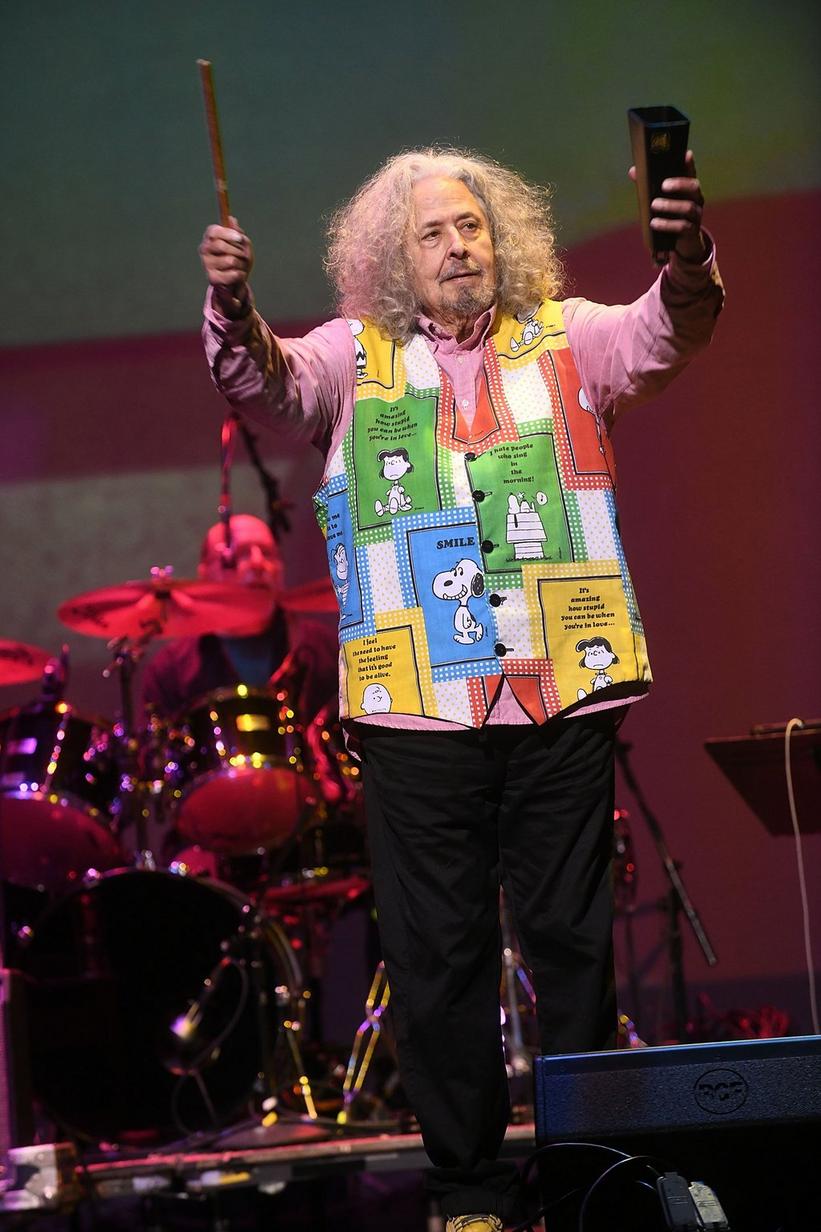
*Mark Volman performing on the “Happy Together” tour in 2022. Photo: Bobby Bank via Getty Images*
When you let go of the negativity and look back on your long career, what are you most proud of?
Well, every little piece of the pie, there's just no way you can say without one, we wouldn't have the other.
Without "Happy Together," we wouldn't have had the chance to sing with the Mothers of Invention. I mean, we sang with Bono at Carnegie Hall, with the guys from U2.
Our luck is that we made our connection to producers. Roy Thomas Baker, we sang with Roy on a bunch of records that he was making with so many groups and so many of the artists. Nobody knows we sang "Hungry Heart" with Bruce Springsteen. "Hungry Heart" got him into the top 10. We laughingly said something like, "Without us you wouldn't have anything."
When we did "Bang a Gong (Get it On)," the T. Rex record, I asked Marc Bolan, "Are we going to get paid for it?" And he said no.
Oh, god.
In the end result, the circle was way unbroken. That's why there's a real tenderness for the time spent in the music industry.
At the same time I got involved with Howard, we did radio in New York at WXRK. We were working with Shadoe Stevens and Dr. Demento and all of these great radio personalities that taught us about radio.
[Frank] had a record company called Bizarre/Straight Records. And there we were messing around with Frank in the studio making records, doing a movie, 200 Motels.
It's been a lifelong [journey], but I just say to all the folks, "I hope we didn't let you down." Sometimes Turtles fans, Flo & Eddie fans, there's a little part of me that thought, what if we'd have just stayed inthat pop music thing? Where would we be today?
I probably would be like Michael Jackson. Oh, make sure there's a comma after that: "and he laughed."
Living Legends: Roger McGuinn On The History Of The Byrds, His One-Man Show And Editing His Own Wikipedia Page


